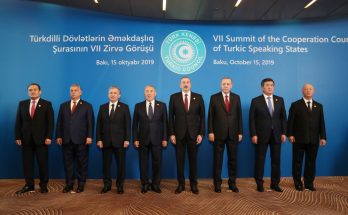
South Caucasus region is important for stability in Europe, OSCE chairperson-in-office, Serbia’s Foreign Minister Ivica Dacic said.
He made the remarks during the briefing in Baku on June 1, following the negotiations with Azerbaijani Foreign Minister Elmar Mammadyarov.
Dacic has visited Baku as part of his tour to the South Caucasus countries as the OSCE chairperson-in-office.
Dacic expressed hope that Serbia will be able to contribute to the settlement of the Armenian-Azerbaijani Nagorno-Karabakh conflict.
He added that the conflicting sides themselves also have great responsibility in the issue of settlement of the Nagorno-Karabakh conflict.
“At the request of the Azerbaijani side, during the meeting with Armenian leadership, I am going to raise the issue of returning of two Azerbaijani hostages in the shortest possible time,” said OSCE chairperson.
Dacic added that Serbia itself suffered from a conflict and well understands the severe consequences of the Nagorno-Karabakh conflict.
He said that Serbia has a sensitive attitude to the territorial integrity of states as well.
Nagorno-Karabakh conflict can be resolved only though peaceful means and with political will, said Dacic. “It is necessary to comply with the principles of the Helsinki Final Act and avoid double standards.”
Azerbaijani Foreign Minister Elmar Mammadyarov, for his part, said during the briefing that the principle of territorial integrity of states is more important than the principle of self-determination.
“The conflict will be resolved sooner of later, there will be various issues that will need settlement and then we will need Serbia’s experience,” he said.
Dacic said that Serbia has great experience in eliminating the consequences of war. Serbia will make every effort to become the mediator in the conflict’s settlement and for resolving the further issues, he added.
The conflict between the two South Caucasus countries began in 1988 when Armenia made territorial claims against Azerbaijan. As a result of the ensuing war, in 1992 Armenian armed forces occupied 20 percent of Azerbaijan, including the Nagorno-Karabakh region and seven surrounding districts.
The two countries signed a ceasefire agreement in 1994. The co-chairs of the OSCE Minsk Group, Russia, France and the US are currently holding peace negotiations.
Armenia has not yet implemented the UN Security Council’s four resolutions on the liberation of the Nagorno-Karabakh and the surrounding regions.
/Trend/




